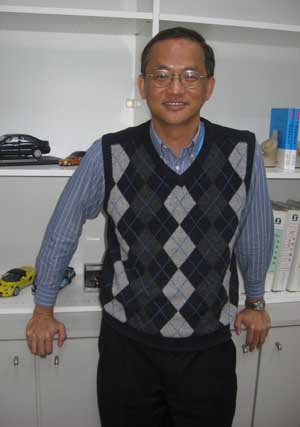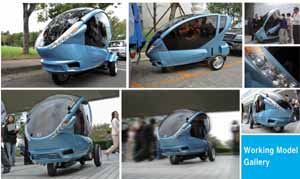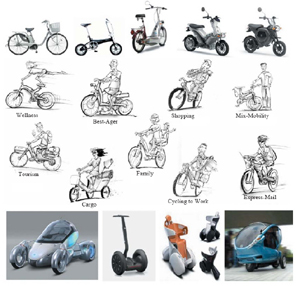New MSL Deputy Director Believes Taiwan is Ideal to Develop Electro-vehicles
2009/03/17 | By Quincy LiangDevoting years of effort to develop vehicular technologies in Taiwan to realize urban transport solutions based on need has paid off again, besides playing a role to launch an LEV in 2007, for James Wang, a familiar figure at the Industrial Technology Research Institute (ITRI), the largest and most important industrial technology development hub on the island: he has been promoted as the deputy director of the Mechanical & System Research Laboratories (MSL) under the ITRI.

Besides being the convener of the Automotive Electronics Consortium under the Taiwan Electrical and Electronic Manufacturers' Association (TEEMA), Wang was also the former director of the Intelligent Mobility Technology Division at the MSL, where he led a sizable 200-member team.
During the first post-promotion interview with a CENS reporter, Wang reiterates that ITRI aims to continue playing a key role to develop the local vehicular industry, specifically focusing on electric propulsion-in line with the government policies and global trend.
Booming Era
"With increasingly improving battery technology and, more importantly, global focus on environment-friendly transportation equipment, electric vehicles are given more application opportunities to replace internal-combustion counterparts," Wang points out. "It is a booming era for electric alternatives in especially smaller-sized, light-duty vehicle applications, including light electric vehicles (LEVs) for personal mobility, all terrain vehicle (ATV), golf cart, utility vehicle, urban car etc."

"Electric vehicle offers the best opportunity for Taiwanese makers to jump into or even lead the global market, and now is the right time to get into the business," the deputy director points out. "Taiwan companies can expect to make the most of this window of opportunity to tap the international vehicle market with niche, new, innovative products if they stay ahead of rivals worldwide."
A new, niche market, Wang continues, is one with few products developed by few players. "That's why the ITRI launched a concept LEV prototype in 2007, which is just the initial platform with established modularized vehicle technologies," Wang justifies ITRI's strategy. "With the concept of LEV, we hope to trigger brainstorming and ignite unlimited demand from related industries. Also the new prototype is expected to stimulate development and integration of new vehicle technologies, and inspire business models to achieve synergy in Taiwan's electric-vehicle line."
The LEV Urban Mobility Industry Alliance (LUMIA) was set up in Taiwan in April 2008 to further enhance the development of the LEV industry on the island, Wang says, with vehicle makers, parts suppliers, service providers, and various governmental authorities working hand in hand to push ahead the local electric-vehicle industry. The goal of the LUMIA is to share LEV technologies and service-model information, as well as jointly explore possible business opportunities, he adds.

The LUMIA is a successful initial phase, Wang says, and more and more alliances and individuals are expected to come aboard to develop products and business models.
Helping Find Niches
"However, ITRI's role is not to develop commercialized products for private makers, who should find their market positions and build competitive niche products by themselves," Wang stresses. "Our role is to help interested companies access potential niches and create concept vehicles that can be platforms upon which carmakers can build future niche products."
The new deputy director cites several "potential niche products" under development at ITRI labs, including a very innovative idea: mini electric vehicles with foldable mechanisms that link them together, like shopping trolleys in malls or luggage carts in airports.
"R&D projects begin based on need," Wang says, "and we develop prototypes while considering technical concerns and feasible innovations." The ITRI saw a need to save parking space and, may be more importantly, for easier and faster commutes to fixed points as public transit stations, big parking lots etc., which inspired building the above-mentioned shopping-trolley-like mini LEV, according to Wang, and a concept is realized by simultaneously targeting a vehicle type and possible operating modes.
Thinking Outside the Box
"To create new value in electric vehicles calls for thinking outside the box. We should not equate an electric motor with an internal combustion engine, nor a battery to a fuel tank," the deputy director reminds. "If you draw parallels between these two types of vehicles, the electric ones cannot compete in terms of price."
"We should focus on the advantages of electric vehicles to maximize them for creating new value."
Electric vehicles have some unmatched advantages, according to Wang, and the first is that most of the major systems are connected by cables rather than conventional mechanisms as the drive shaft, steering rack etc. "That means," he points out, "electric vehicles have relatively more space, simplicity for freer designs of structure and styling."
Another great advantage of electric vehicles is that power is consumed only when driven, while they can also be recharged through braking, driving, braking. Such characteristics, according to Wang, make electric vehicles the most economical, energy-efficient transport for urban mobility, which calls for frequent stop-and-go.
Electric vehicles also have excellent torque response, being driven by electric motors, and good acceleration, as well as being very quiet compared to gasoline powered counterparts; but downsides are that the range between recharge tends to be short, typically less than 100 miles, recharging often takes a few hours, and battery packs are both expensive and heavy.
So, Wang says, "designing electric vehicles should optimize their inherent advantages rather than tapping hybrid drives as for conventional gasoline-engine vehicles. The ITRI hopes to utilize our integrated strength achieved by about 6,000 professionals to engage in R&D projects, and we have achieved some initial success."
Given that most electric powertrains are attached to wheels (i.e. hub motors), Wang points out, designing a electric vehicle allows ample freedom for creativity and innovation, as well as new ideas on business models. "Hub motors and portable battery packs (for easier recharging onboard or off) have become the key advantages of LEVs to overcome the initial hindrances in the electric-vehicle market," Wang says.
Surprising Facts
Citing some surprising facts found by surveys done by related organizations, Wang says, "cars in Taiwan typically are driven daily on average only a little more than 30 kilometers (km) and about 17 km for powered two-wheelers (PTWs)."
"Such data, for example, inspired in us new ideas, including the development of modular battery packs, which can be easily plugged in to extend driving range as needed," Wang says. "No one dares to buy a vehicle with a driving range close to the typical mileage driven daily, nor will many drive in a day till the gas tanks run dry. So we have to make breakthroughs to build new electric vehicles to address such needs and encourage people to use them."
Many people lead unchanging daily lives that often result in repetitive distances driven, especially the daily commute to-and-from work. In fact, courier vans in cities typically log on average less than 10 km daily. "If a targeted group drives habitually as in urban stop-and-go, logging predictable daily distances as 20 kms," Wang says, "we can design electric vehicles to meet such demand for minimal cost, by eliminating additional functions and batteries. In addition, we can also design portable battery packs that are easy plug-ins to extend driving range."
Such design and development concepts, Wang claims, are expected to ease consumers' worries of short driving range, high vehicle price tags etc.; offer the highest product flexibility for carmakers to effectively stimulate market demand. "All we do is try to see through the eyes of consumers rather than carmakers to further promote the development of the electric-vehicle industry in Taiwan," Wang says. "Doing so encompasses a very wide array of fields, including vehicle, chemical, service, and high-technology industries. So, the ITRI is the only eligible organization in Taiwan, and one of the few globally, with such comprehensive capability to tackle such complicated and inter-industry project."
Taiwan Advantage
Wang firmly believes that Taiwan is ideal to develop the electric-vehicle industry. "Taiwan is internationally famous for unmatched flexibility and rapid respond," Wang points out, "but we must be aware that the development of the electric-vehicle industry on the island requires teamwork between the government and private sector."
A window of opportunity is opening, the deputy director says, as the government plans to subsidize buying electric-scooters this year. In addition, the ITRI has been commissioned by the government to find one or more zones to trial test, first in a closes-area, developed e-scooters and explore potential new business models.
"One of the best locations to trial run e-scooters is the ITRI campus," Wang says. "Other good choices include the offshore islands, big communities, or big-scale functions. I have many persuasive reasons to believe now is the right time to further develop electric vehicles in Taiwan, one of which is the potentially volatile oil prices. Another globally relevant reason is rapid urbanization worldwide, which requires effective commuting vehicles to ease traffic and pollution problems."

